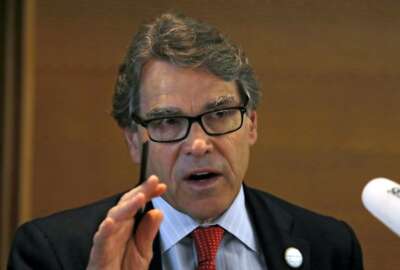
Perry defends use of non-commercial flights as Energy secretary
Energy Secretary Rick Perry defended his use of non-commercial aircraft for official travel, which the department says has come with a $50,000-plus price tag.
Scrutiny around the use of private and government planes led to the ouster of former Health and Human Services Secretary Tom Price, and opened ongoing investigations at the Treasury and Interior departments and the Environmental Protection Agency. Now the Energy Department’s inspector general may weigh in on Secretary Rick Perry’s travel practices.
The issue of travel expenditures dominated an Oct. 12 House Energy and Commerce Committee energy subcommittee hearing, during which Perry defended his use of non-commercial aircraft, which the Energy Department says has come with a $50,000-plus price tag.
Rep. Frank Pallone (D-N.J.), the full committee’s ranking member, said he has asked the Energy Department’s Office of Inspector General to audit the secretary’s travel practices. But from Perry’s perspective, many of the department’s facilities exist in locations far from commercial flight hubs.
For example, Perry cited a Sept. 28 charted flight from Hazleton, Pennsylvania, where he toured a rare-earth mineral mine, to Portsmouth, Ohio, where he was scheduled to visit a nearby uranium facility.
“The point is, it’s really difficult for us to have gotten there without taking that private aircraft to Hazleton,” Perry told committee members. “We’ve looked at this closely. We’ve been thoughtful about how we did it.”
Rep. Joe Barton (R-Texas), the committee’s vice chairman, defended Perry as being transparent with his travel habits, and noted that the Energy Department has planes of its own in order to accommodate out-of-the-way official travel.
“I’m going to continue to do my job,” Perry said. “But realizing that from time to time, if I’m going to be in those places and we’re going to be there in a timely fashion, we may have to do it in a way that does expend some taxpayers dollars.”
An Energy Department OIG spokesperson told Federal News Radio on Tuesday that “we have received the [audit] request and are currently assessing its content.”
Perry defends FY 2018 budget proposal cuts
Rep. Scott Peters (D-Calif.) called on Perry to defend the Trump administration’s fiscal 2018 budget proposal, which would withdraw all funding from the Advanced Research Project Agency-Energy (ARPA-E), which provides research and development funding to foster new energy technology. The budget proposal would also cut $1 million, or about 17 percent, from the Office of Science, which funds 17 national laboratories.
Perry said he would continue to defend the department’s ability to fund innovation, even if he doesn’t agree with the White House’s proposed method of funding.
“I didn’t write this budget and my job is to defend it, which from time to time is counter to what I think is good public policy. This happens to be one of those,” Perry said.
Energy Dept. tasked with energy sector defense
Rep. John Sarbanes (D-Md.) asked Perry what steps the department has made to improve its cybersecurity posture under provisions in a 2015 law. The Fixing America’s Surface Transportation (FAST) Act tapped the Energy Department as the lead agency responsible for energy sector cybersecurity, which includes potential attack’s on the nation’s energy grid.
“The strategy for the energy sector is to leverage strong partnerships with the private sector. We’ve got three labs that specifically, their role is called cyber corps. Their role is to focus on the cybersecurity issues working with the private sector to strengthen today’s cyber systems and risk management capabilities,” Perry said.
Copyright © 2025 Federal News Network. All rights reserved. This website is not intended for users located within the European Economic Area.
Jory Heckman is a reporter at Federal News Network covering U.S. Postal Service, IRS, big data and technology issues.
Follow @jheckmanWFED





